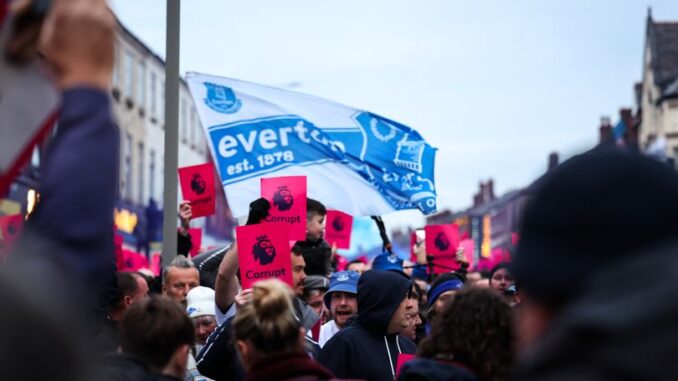
As the Super League ruling draws closer, Everton’s decision may create more problems for the Premier League
Even though Sunday’s match did not turn out as Everton supporters had hoped,
they did not stop talking about the Premier League’s punishment of the team.
Huge crowds of Everton supporters marched to Goodison Park ahead of the team’s first game after an
independent panel upheld a case against the Toffees of breaking profit and sustainability criteria,
which resulted in an automatic 10-point deduction.

Many in the larger football world, including Everton supporters,
believe that the club has been given an excessively punitive deduction for a £20 million overspending spree in
which the commission failed to determine that any competitive advantage was obtained.
Leeds United, Burnley, and Leicester City—clubs that were demoted during seasons in which
Everton narrowly avoided relegation will make that case in an attempt to pursue monetary recompense
in the wake of the independent commission’s ruling earlier this month.
A plane flew over the Etihad Stadium on Saturday during the Manchester City and Liverpool game,
which was broadcast live on Sky Sports and seen by millions worldwide,
carrying a trailing banner that read “Premier League = corrupt.”
Numerous Everton supporters held up placards with the word “corrupt” emblazoned on them.
The 1878 Everton Supporters Group had provided funding for both the plane and the flag.
For the first time in a long time, a league that has been experiencing tremendous development for many years
boosted by lucrative TV deals that have allowed them to distance themselves from their main European rivals,
Spain, Italy, Germany, and France—finds itself the target of significant criticism from supporters.
The Premier League finds itself having set a harsh precedent in dealing with Everton,
one that gives them little leeway should Manchester City or Chelsea also be found to have been in violation.
This is due to the decisions made regarding Manchester City’s 115 charges for breaking PSR,
as well as the fact that Chelsea is also under investigation regarding claims of historic payments made by
former owner Roman Abramovich to aid the club while evading financial fair play regulations.
But will the Premier League be affected in a way that could generate problems for them in the future,
given what has happened to Everton and what might happen to Manchester City and Chelsea?
According to Daniel Haddad, head of commercial at international sports advisory firm Octagon,
“the Premier League is in the strongest position that it’s ever been in compared to other football competitions.”
Haddad has extensive experience in football commercials and also specialises in financial fair play issues.
He made this statement to the ECHO.
When it comes to TV rights, France and Italy are leading the way.
While Italy received some private equity backing to help with this,
what they are really receiving from the market is far less than what Serie A claimed to be their basic expectations.
The entire beIN and Canal+ experience was had in France, and those rights are now worth absolutely nothing.
Some clubs in Spain, including Real Madrid, Barcelona,
and Athletic Bilbao, chose not to participate in the CVC arrangement that La Liga brought in.
Barcelona made their own arrangement by taking a financial risk on the value of their media rights.
The other leagues’ media rights policies are so unclear,
whereas the Premier League is likely doing sensibly by extending its broadcast window in
the UK and adding more games to its schedule.
Most likely, only they will be the league that keeps the value of all media rights rising. Clearly,
in order to do that, they are providing the market with greater inventory.
However, if you compare them to every other league and look at comparative data,
they are now leading by even more points than they did previously.
They are now in a tremendously strong position in terms of talent,
cash, and viewership inside the football business model.
The other point is that, in contrast to other leagues, there are currently six or seven clubs that are part of
what is referred to as the “top table” as a result of club acquisitions and foreign ownership.
There are so many clubs there that the other leagues cannot depend on them.
For example, the financial problems facing Barcelona affect La Liga as a whole far more than
if one or two Premier League teams are sanctioned,
because there is no monopoly or duopoly.
“Manchester City may win the title for a number of years in a row,
but there are other teams pushing for a larger income share.
There is a problem with that since only four may advance to the Champions League.
Think about Super League models, etc., to get an idea of this intriguing power dynamic.
The logic behind how many teams may qualify for the Champions League is, in a sense,
the reason those clubs were drawn to the idea.
“I don’t believe there is a better option than to implement these penalties.
I believe the concern is whether these clubs can get a clear and reasonable process for figuring out what the
consequences will be in the event that an impartial commission finds that
these groups have violated the regulations.
“Looking at what has transpired in the EFL,
you can see that everyone is aware of the consequences for entering administration, etc.
The peculiar dynamic in the Premier League is that there are these sports sanctions
that people are largely unaware of—for example, “if X occurs, what is the punishment for that”?
if they had gone into administration and were deducted 21 points.”
“People want explanations and consistency, and I believe Everton supporters share that desire.
I believe that most people would agree that, in terms of profit and sustainability regulations,
the infringement is largely obvious; the issue lies in how the choice is put into practise.
All of this points to the need for future transparency when
it comes to “what does X mean in terms of sanctions?
” Nobody truly knew the full extent of sanctions when UEFA originally imposed FFP,
and it’s probably difficult to identify a recurring theme in their FFP rulings.
“I don’t believe there is a long-term threat to the Premier League as a product,
regardless of what transpires with the Manchester City or Chelsea case, or with what we’ve seen with Everton.
It all boils down to how big of an advantage you need to have in order for incidences to not take it away.
I would go back to the Manchester United of Sir Alex Ferguson,
who won everything for two decades.
Although they haven’t been among the top British teams in the last ten years,
they are still the largest club in the world by measures.
It is quite difficult to lose an advantage of that kind once it has been established.
The Premier League fits that type of description, in my opinion.
The European Court of Justice will make a decision on December 21 about the legality of
the plans to create a European Super League and the monopolistic nature of the UEFA,
the organisation in charge of overseeing European football.
Haddad is of the opinion that the ECJ ruling against UEFA could have repercussions in the future,
even though he does not think that the Premier League’s ongoing efforts to expand would be
adversely affected by the penalties imposed on Everton or any other teams that might receive them.
He declared: “On December 21, the European Court will rule in the Super League case,
which will cause a lot of problems for other leagues, not only the Premier League.
What it will demonstrate is whether a club may be able to exert influence elsewhere
if it feels unfairly treated or refuses to accept sanctions.
They might declare, “We don’t like what you did, so we’re going to team up with Real Madrid and Barcelona.”
“Tribals play football.” A sizable portion of the fan base will always disagree with any decision that is made against their club.
Its tribal appeal is one of the factors contributing to its widespread appeal.
People wouldn’t worry as much if Red Bull lost 100 points in Formula One because there isn’t the same kind of tribalism in football.
“These problems were avoided when designing the US model. Everything has a specified definition.
Doping and cheating are the main topics of American sports controversies, not money.
That’s a result of how tightly wound everything is.
It is heavily regulated, therefore it isn’t quite a free market.
In essence, you already know how big your local market is.
You cannot use your sponsorship of the New York Jets, for instance, outside of New York.
The franchise model, which states, “Here is your supporter base, here is your market size,
and here are the financial constraints that you have to operate under,” is how American sports are run.
With salary ceilings in place, it is difficult to achieve a scenario where there are violations and no need.
“The Premier League won’t take a harsh stance or impose rigid salary limitations.
They don’t even offer a “here is your budget for this season based on predicted costs” service like La Liga offers.
In reality, the Premier League has been more lenient, letting clubs carry on while adhering to the rules.
“You could take the United States approach,
where everything is centralised and people can’t simply break the law by saying, ‘This is your budget.'”
“The other extreme is to totally remove financial restrictions from football and let everyone do as they please.
“The only way I can see it affected is if something in the market were to seriously harm the Premier League’s reputation or put it at jeopardy.
However, if anything that combines the top teams from a few other leagues is introduced on the market in the next two or three years,
it might pose a threat to UK-based products.
Because it is practically the only way for them to be able to compete with the Premier League in the long run,
that is the reason why Real Madrid and Barcelona are pushing so hard for that kind of system.
“I see nothing that would happen to harm the product to the point where fans would
start tuning in to La Liga or the Bundesliga more if the structure of European football remains
the same in terms of a ‘open’ Champions League.
Get more related news onhttps://dailysportnews.co.uk

Leave a Reply